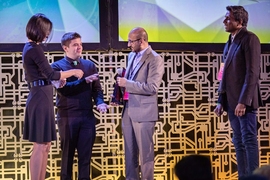The MIT Initiative on the Digital Economy has awarded over $1 million in prize money in its second annual MIT Inclusive Innovation Challenge (IIC) in recognition and celebration of for-profit and nonprofit organizations using technology to improve economic opportunity for base- and middle-level income earners.
Held yesterday evening in Boston during HUBweek, IIC’s gala celebration featured such luminaries as Eric Schmidt, executive chariman of Alphabet Inc., and Mignon Clyburn, Federal Communications Commission (FCC) commissioner, among others.
Approximately 1,000 organizations from around the world competed in the challenge. Nearly 160 expert core judges reviewed the applications. The 16 top-scoring competitors — all of which are inventing a more inclusive, productive, and sustainable future for the global workforce — advanced to a Champion Committee, which selected four grand-prize winners.
In all, the IIC awarded $150,000 to each of the four grand-prize winners, and $35,000 each to 12 runners-up competing in four categories: Financial Inclusion; Income Growth and Job Creation; Skills and Matching; and Technology Access.
The grand prize winners are:
LaunchCode (Skills and Matching category): LaunchCode expands the tech workforce across the U.S. by providing free coding education to jobseekers lacking traditional credentials, using a low-cost, scalable model that quickly replicates in-person coding classes, followed by matching participants to paid apprenticeships with hundreds of companies via a digital platform that helps them transition into full-time employment.
AdmitHub (Technology Access category): Of the approximately 2.5 million U.S. students who enroll at colleges each year, 48 percent fail to earn a degree within six years. Students who drop out come disproportionately from underserved communities. The societal impact is staggering, costing the U.S. an estimated $4.5 billion in lost earnings and taxes annually. AdmitHub has designed an innovative solution — an artificial intelligence virtual assistant. With it, students receive 24/7 personalized support, and more data is available for universities to provide greater individual support.
EFL (Financial Inclusion category): Three billion people worldwide lack the credit history lenders require to make a loan. This creates a missed opportunity for lenders along with widespread financial exclusion. EFL brings 10 years of experience applying psychometrics and behavioral science to loan repayment, providing insight into how personality drives credit risk across cultures and segments, allowing users to effectively score potential borrowers anywhere at any time. With more than $1.5 billion lent across 15 countries, EFL is empowering lenders to grow with less risk.
Logistimo (Income and Jobs category): Constrained by availability, reliability, and affordability of transport, villages in rural frontier communities lack access to essential goods, rendering them underserved and disconnected from mainstream value chains. Logistimo’s digital auction-based platform — using demand aggregation, load/route/schedule optimization, and fulfilment tracking — better connects demand to local capacity. Logistimo’s vehicle-agnostic approach supports milk runs and line-hauls, seamlessly integrating trucks, bikes, boats, and UAVs alike. During 18 months, the platform has performed 14,000 deliveries for 1,000 customers, and more than 80 jobs have been created alongside a 300 percent income increase for many transporters.
The 12 runners-up are:
African Renewable Energy Distributor Ltd (Technology Access) has developed a one-stop shop mobile solar kiosk to promote African entrepreneurship.
AID:Tech (Financial Inclusion) uses Blockchain technology to revolutionize how governments, corporates, and non-governmental organizations deliver digital entitlements across the world.
Digital Citizen Fund (Technology Access) helps girls and women in developing countries gain access to technology, virtually connect with others across the world, and obtain necessary skills for success.
dot Learn (Technology Access) creates technology for data-light video learning in emerging markets.
Hogaru (Income Growth and Job Creation) empowers women in Latin America’s cleaning industry by leveraging technology to select, train, and manage teams while connecting them to over 7,000 customers.
iHub (Skills and Matching) provides upcoming developers in Kenya with an opportunity to work in teams alongside more experienced engineers on real-world projects.
Leap Skills Academy (Skills and Matching) mentors, trains and provides employment opportunities to students from low-income households in India through technology and classroom training.
New Day (Skills and Matching) is a smartphone-centric, low- to mid-income employment platform for developing markets worldwide, enabling scalable and rewarding job matching, skills building, and employer transparency.
Nomanini (Financial Inclusion) is a South African-based enterprise enabling merchants to facilitate a wide range of basic transactions including mobile top-ups, utility payments, remittances, deposits, withdrawals, account opening, and mobile money/card acceptance.
SkillSmart (Income Growth and Job Creation) levels the playing field and transforms the talent development process by driving from employer demand and connecting employers and job seekers at the skill level.
Tala (Financial Inclusion) is a mobile technology and data science company that is building financial identities for underserved people in emerging markets through alternative data and instant credit.
Tuteria (Income Growth and Job Creation) uses an online platform where learners can easily find, evaluate, book, pay for, and track lessons with a verified local teacher in any subject, skill, or exam.
“The grand challenge of our era is to use digital technologies to create not only prosperity, but shared prosperity,” says Erik Brynjolfsson, director of the MIT Initiative on the Digital Economy and the Schussel Family Professor of Management Science at the MIT Sloan School of Management. “We created the Inclusive Innovation Challenge to recognize and reward the many amazing people and organizations that are working to accomplish this mission.”
"With the IIC, we're celebrating the entrepreneurs and innovators who are demonstrating so many different ways to put powerful technology to use to improve people's economic prospects,” adds Andrew McAfee, co-director of the MIT Initiative on the Digital Economy and principal research scientist at MIT Sloan. “Our award winners and other entrants show us that broadly shared prosperity is possible, which makes a great antidote to pessimism and negativity.”
The IIC was funded with support from Google.org; The Joyce Foundation; and Joseph Eastin and ISN.
For more information on IIC winners and its mission, please visit MITinclusiveinnovation.com.









